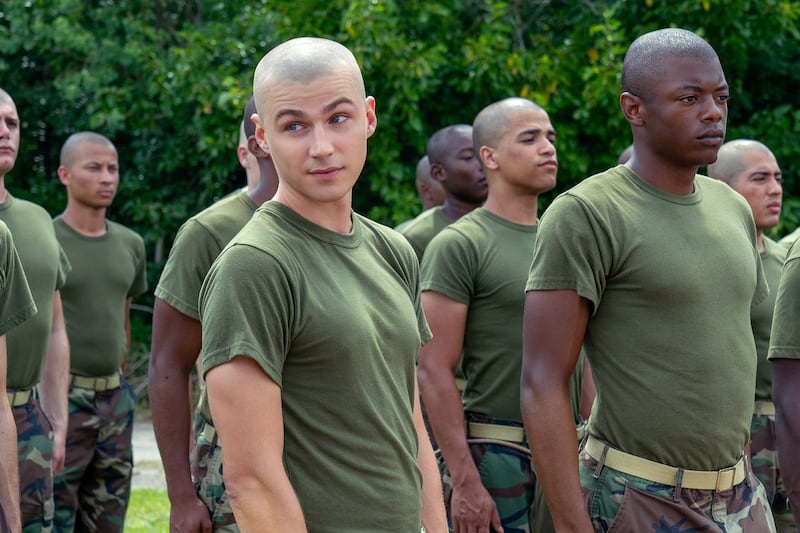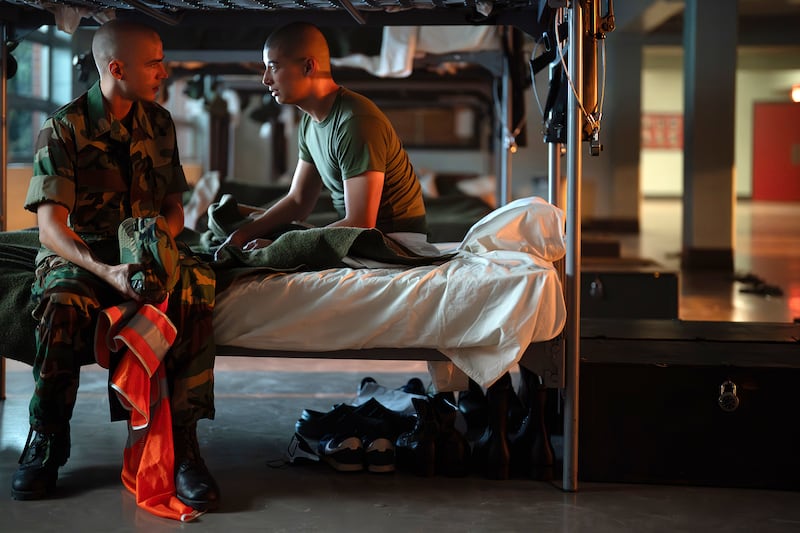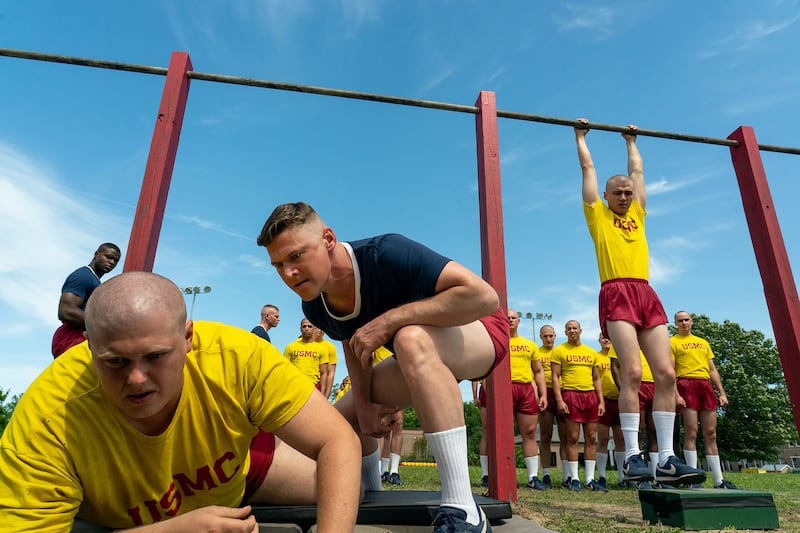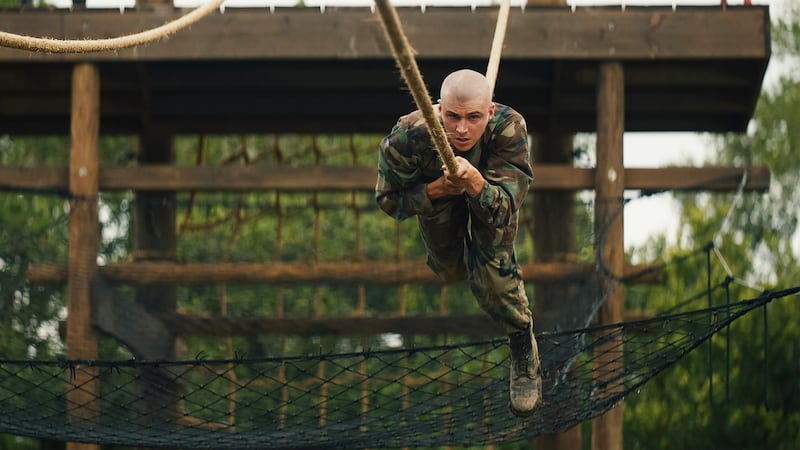The year is 1990, and closeted gay teen Cameron has just had his head shaved and clothes stripped, and he’s eaten lunch scraps out of the bin. It’s not quite the summer camp adventure Cameron had hoped for from the Marine Corps boot camp.
Miles Heizer, the star of the new Netflix series Boots, commiserates with the this unexpected and transformative experience. The show, he tells The Daily Beast’s Obsessed, “isn’t what anyone expects it to be on paper.”
The Parenthood, 13 Reasons Why and Love, Simon actor returns to Netflix for this queer Marine Corps drama—one packed with raging testosterone, toxic masculinity and unexpected bonds.
Inspired by Greg Cope White’s memoir The Pink Marine, Boots follows Cameon and his bestie, Ray (Liam Oh), the only person who knows he’s gay, as they enlist in the military after high school. Promising an experience that will turn boys into men, the boot camp functions under the tyrannical reign of new Sergeant Robert “Bobby” Sullivan (Max Parker), who paces the floor like a panther hunting for prey. Ultimately, Cameron is just trying to survive.
Set in the 1990s, when military regulations explicitly banned gay people from service, Boots predates the army’s “Don’t Ask, Don’t Tell” policy, which was in place from 1994 to 2011. This historical underpinning grounds Boots, which is certainly relevant to the current U.S. administration—though Boots still has the hallmarks of a classic coming-of-age tale and a playful sense of humour. (An “I Want To Break Free” needle drop, for example, or Cameron speaking to his sassy inner voice.)
We sat down with Heizer ahead of Boots’ premiere to discuss the relevance of this queer role, the LGBTQ+ history of the U.S. Marines and being part of the much-anticipated adaptation of Emily Henry’s People We Meet On Vacation.
I wanted to start by noting how nice it is for there to be a series with a gay lead and a straight supporting character. What was your first impression of Cameron?
I’ve been acting since I was 10, so I’ve had a lot of auditions. This was one where I thought, “I’m going to try not to get too attached for them to be like Evan Peters is doing the part.” But I connected so intensely with the character. The show views this hyper-masculine world through a queer lens, the same as Greg’s book. But he was very upfront about wanting this to be Cameron’s story, not Greg’s.

This gay-straight friendship is so cool. It’s inspired by Greg and his best friend, Dale. That was such a point [I drew from] that we don’t see portrayed too much. But it’s extremely common. Now, there are fewer boundaries between gay and straight people. So it’s fun to show that, especially at a different time in history.
Boots is set in the past, yet it feels as though it has real significance now, with the current U.S. administration banning trans people from military service. Did the show feel like it had a timeliness or relevance?
It’s been almost three years since we began. There were huge delays because of the writers’ and actors’ strikes. So, I don’t think the intention was to have a message to the state of the military in the current day, because the trans ban had been reversed, and it seemed we were potentially making progress. Now, it’s much more relevant than we thought when we made it.
We had military advisors on set who served for many, many years. Leon [Ingleright] was kicked out of the Marines because he was gay. Our other military advisor, Gunny [Sammy ‘Gunny’ Wray], served with him. Hearing their views on it and how upsetting it was to see Leon lose everything, all his accolades stripped from him, was very enlightening. At its core, there’s mutual respect that goes far beyond someone’s sexuality or gender, and I hope that the majority of people feel that way when it comes down to it.

The show captures an important chapter in LGBTQ+ history with the gay military ban and the “Don’t Ask, Don’t Tell” era. What did it mean to you to be part of a production putting that in the spotlight?
We all try to have perspective, especially newer generations of queer people, but it does remind me to have even more respect for the queer people who came before us, and how much they had to fight. The fact that there is a show on Netflix about a queer character is not wasted on me. It’s only possible because of the people before us who fought when it was really dangerous. They were willing to make that sacrifice so that we could be here talking about this gay Netflix show.
It sounds so cheesy, but I vow to continue the fight and try to make it better for each generation to come. It’s so cliché, but it’s true. We all deserve the right to a happy life. The truth is, anyone in our alphabet, we all have the same desire to be happy, have a nice life and watch our TV shows.
Alongside the show’s portrayal of queerness, Boots also showcases the diversity of masculinity. With the range of actors coming together on set for a collective experience, did the filming experience represent the camaraderie of a boot camp?

It was very much mirrored. We all come from different states and backgrounds, put into this phantom boot camp experience. Regardless of what it looks like, we were all there all day, every day. We spent so much time together that it mirrored the characters’ experience. We had enough time to put aside all preconceived notions and backgrounds and connect on a human level, forming intense, close bonds.
Also, we had this experience of our individuality being stripped from us; we’re all bald, wearing the same outfits. Now, when I see them with hair, I’m horrified. Like Liam, who plays Ray, has beautiful, long hair. I just see him as this bald person in a green t-shirt.
I wanted to ask about being bald. For some people, hair is a precious thing. How did you feel about shaving your head?
I didn’t have any hesitation. The shaving represented a weird safety to us; we could relax as they couldn’t fire us now. [Laughs] It was a bonding moment for production. They would shoot from the front, then move to the next person, so there’s a long period of time we’re sitting there with patches of missing hair.

When it came off, I was like, “It’s kind of chic.” I don’t have to worry about what my hair looks like. Washing it takes 20 seconds. I had scalp problems that healed. Now it’s growing back, but I’ll shave it off for Season 2.
There’s also a physicality to your performance. I’m thinking of the assault course, in particular, how was being involved with those physical challenges?
It was tough; however, we’re being treated extremely well the whole time. There were definitely some tough days. There are things that look really hard, that you would think would be the hardest, but I remember struggling with the most mundane things.
There’s a scene in the first episode where [we do] 90-6, where we hold the gun forward, then put it down. That was the hardest for me because these guns are not light. Max has this huge monologue, and we were filming all day. It’s funny, you can see people in the background with arms trembling.
I had the luxury of Cameron going into it blindly, so I took the approach that there’s no point in trying to get good at any of this stuff. I’ll just fail my way through it, as Cameron would. But the other boys prepared themselves a little bit more. My preparation was that I watched Golden Girls because I’m like, he loves the show.
I won’t go into Golden Girls, or I’ll talk for hours. This Marine boot camp is Cameron’s attempt to “become a real man,” a misdirected search for self-progression. I wonder if you’ve had a similar experience of trying to push yourself.
That’s a really interesting question. When I was super young, I played baseball and joined a cheerleading team, so there wasn’t too much of that happening for me… I do think growing up in the entertainment industry, I had a lot of fear about being gay and what that might mean for my future and career. We’ve made so much progress in the last five to 10 years; to be doing an interview about this show is something I never thought would be a possibility. So I think my version of boot camp was hiding myself, trying not to act too gay, trying to blend in. It didn’t work, but I did try my best.
You’ve also got People We Meet on Vacation coming next year, we’re in a rom-com renaissance! How was your experience shooting the film?
I had the absolute best experience. I did it right after we finished Boots. I was doing this intense training and military stuff, and as soon as I finished, it was like “really sorry, we’re filming in Barcelona.” They had me there for three weeks; I worked sporadically, and I was fully on vacation. I’ve seen the movie, and I have a small enough part in it that I feel that I can say this: it’s gonna be a hit. The performances are so funny and wonderful. People are gonna absolutely love it!
The post Netflix’s ‘Boots’: The Journey to Becoming a Marine as a Gay Man in 1990 appeared first on The Daily Beast.




